Smart Emerging Technologies in Farming in India with Impact
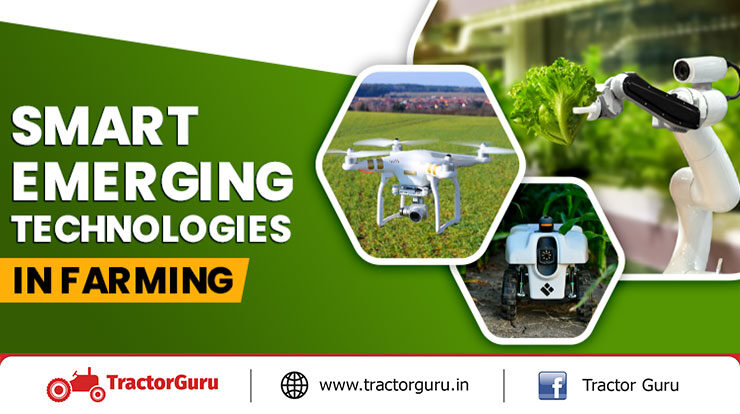
New and emerging technologies in agriculture improve performance and productivity. In addition, it helps to meet the growing consumption needs of the global population. So, that’s why farmers are ready to adopt new emerging technology farming and want to get rid of many problems.
As we know, smart and emerging technologies provide rapid work in less time compared to manual working. By this, every farmer is able to meet the people’s consumption needs. Smart technologies also can help in many ways on their farms that help to upgrade them.
Emerging agriculture technologies help to collect data that helps farmers to monitor and optimise their crops. Moreover, it keeps updated with flexible environmental and ecosystem factors.
Here we have a little limitation: many Indian farmers are still not able to understand smart and emerging technologies. Still, they are unknown about using technologies and working in conventional farming. So, by keeping our farmers in mind, we are here with the list of emerging technologies and the use of technology in farming.
What are Emerging Technologies in Agriculture?
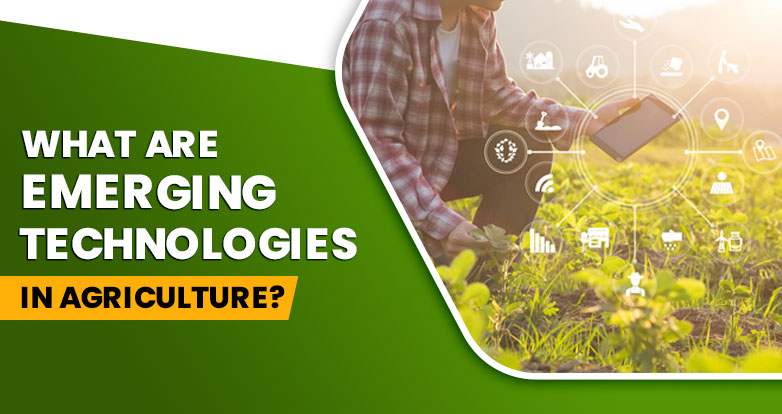
The future of farming technology is increasing day by day. So, that’s why here we are making it quite simple by going to define emerging technologies.
Emerging technologies in agriculture mean advancements in technology are an integral part of today’s agriculture sector. Adoption of new technology in agriculture helps to attain agriculture sustainability goals. It is a concept that refers to managing farms with smart farming technology such as IoT (Internet of things), robotics, agriculture drones, AI, GPS, Smart irrigation technology and sensors. These emerging technologies also increase the farm’s productivity and help to optimise the farm’s and crop’s situation. In addition, the use of technology in farming helps to reduce manual labour and enhance the importance of technology.
Indian farming technology is also a big source of improving the three pillars of sustainable development: economic, social, and environmental. The technology used in farming assists to conserve non-renewable sources and reduce harmful agrochemicals. These smart farming technologies help the farmers predict the weather situation and prepare them for their farming days accordingly.
Impact of Technology on Agriculture
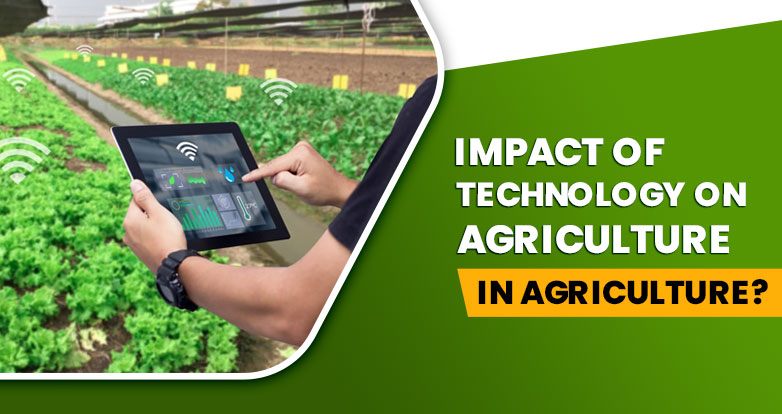
Many people or farmers think about how technology has changed farming? And also about the impacts of technology on agriculture? Here we have some points that show the positive impact of technology on farming with changes. Also, we discussed the future farming technology in India below.
Modern technology farming affects many agricultural tasks such as fertilisers, irrigation, seed sowing technology and many more. The impact of emerging technologies in agricultural engineering is helping to increase crop productivity and pest resistance. In addition, modern technology for farming led to reducing labour work and provides the perfect tilling, planting, harvesting and many farming tasks.
Positive Impact of advanced farming technology on agriculture
- Enhances crop productivity
- Reducing manual tasks like irrigation, fertilisation
- Increase working safety
- Food becomes cheaper in price
- Led to extensive farming method
- Provides productive farming with technology
- Help to analyse efficiency, growth and quality
- Future farming technology impacts to good prediction for crops
- Easily examine data in less time (time-consuming)
- Help to expand farming sustainability
- Going towards green farming technology from manual farming
- Increased the scale, speed and farm equipment productivity
Top 10 Emerging Technologies in Agriculture
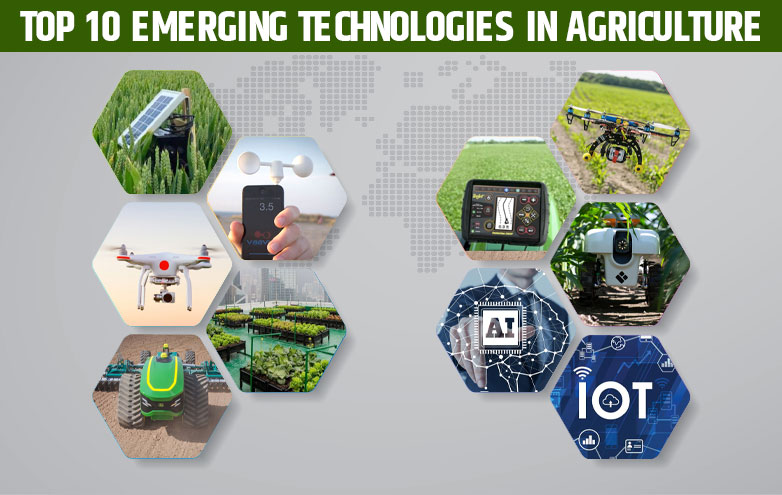
1. Agriculture Sensors
The sensor is a very smart tool that detects natural activities like heat, light, moisture, etc. It converts every natural activity or condition into a digital representation. Many types of sensors help in non-organic and organic farming technology.
- Optical Sensors
- Soil Nutrient Detection Sensors
- Mechanical Soil Sensors
- Dielectric Soil Moisture Sensors
- Location Sensors
- Electronic Sensors
- Airflow Sensors
These all sensors are well efficient and provide accurate information about air temperature, soil temperature, wetness, moisture, humidity, solar radiation, etc. These sensors are used in many agricultural equipment and farming applications.
2. Weather Tracking Technology
The weather tracking tool is mainly used for weather forecasting, which depends on the atmosphere, location and time condition. Predicting every area’s weather manually can be so hectic for the farmers. So, this technology makes weather tracking or forecasting simple.
The weather tracking tool alerts you and tells you when you should start crop irrigation, fertilisation and many more. It also shows the suitable working days to start farming on the field.
3. Ariel Imaging Technology
Ariel imaging technology is used by satellites or low heights aircraft such as image capturing drones. The crucial benefit of this technology is that it provides your farm’s eagle-eye view image. In addition, its single capture makes your tasks easy without stepping out from your office and provides accurate data related to your crops. Generally, it can also evaluate crop consistency very well.
4. Urban Agriculture/ Vertical Farming Technology
High demand, limited space, to grow bulk vegetables! So, vertical farming technology has innovated. But, it needs limited space compared to a big farm to grow crops, vegetables or fruits.
Vertical farming technology is a part of urban agriculture that is used to produce food in a vertical structure or format. In this vertical farming technology, plants’ growth potential becomes higher and also provides fresh food at a low cost. Farmers can try every technology used in vertical farming to grow rare food items with hydroponic technology.
5. Autonomous Tractor
Autonomous tractor (Driverless tractor) is used as a new agriculture technology in modern farming that provides higher efficiency and reduces human interruption. Moreover, they come with many advantages like reliable safety, IoT sharing and many more.
6. GPS
GPS (Global Positioning System) technology provides the benefit of collecting real-time or accurate data. It is mainly used to evaluate locations, farm planning, field mapping, soil sampling, tractor movement, crop observation and many more. In addition, GPS helps farmers to work in low visibility fields such as in rain, fog, wind storm, darkness etc.
7. Drones
Drones are used to capture clear and accurate images of your farms and make possible many critical manual tasks. It also observes crop monitoring, growth of plants and plant productivity. Therefore, drones are a valuable part of agriculture technology for the future. However, the main task of drones is mainly used for things such as irrigation, fertilising, spraying pesticides and so on. Therefore, it saves labour costs and gives more output in less time.
8. Robotics
Technology and automation is the future key for the agriculture sector. And autonomous robotics is one of the valuable, useful and emerging technologies for the future. Robots are mainly used to help farmers to maximise production and reduce labour/ manual work. In addition, robotic technology is used to control the weeds, sow seeds, harvesting and also count in emerging technologies in agriculture livestock and climate.
There are some benefits of adopting robotic technology. A farmer does not need to look at their farm, again and again, they can assist farms with robotic technologies. You can also track the robot’s location and also track their performances. Mainly, robots monitor crop health, estimate farm production, perform multi-cropping, automatic and estimated planting, data collection, and many more.
Type of Robotic technologies in agriculture
- Spraying robots
- Harvesting robots
- Planting robots
- Soil monitoring robots
- Livestock feeding robots
- Crop monitoring robots
9. AI (Artificial Intelligence)
The agriculture industry is emerging towards artificial intelligence (AI) and will be becoming more advanced in the future. AI includes everything such as robots that give accurate data and precision agriculture. It helps to detect and monitor crop health, farm health and make accessible other devices. AI is a cost-saving technology and offers labour intensive work into the farms, also it is the best future farming technology.
10. IoT (Internet of Things)
The Internet of Things (IoT) is smart technology in agriculture by connecting devices to the internet. It enables objects and devices to be sensed and controlled digitally and creates a more direct connection between the physical world and computer-based systems.
IoT is a smart farming technology that has access to monitor crops with the help of sensors, GPS and can track the temperature, light, moisture, crop health and many more. So a farmer can control the device and application of the whole field from anywhere.
There are some examples of 7 emerging agriculture technologies of IoT that can help you to make it more understandable.
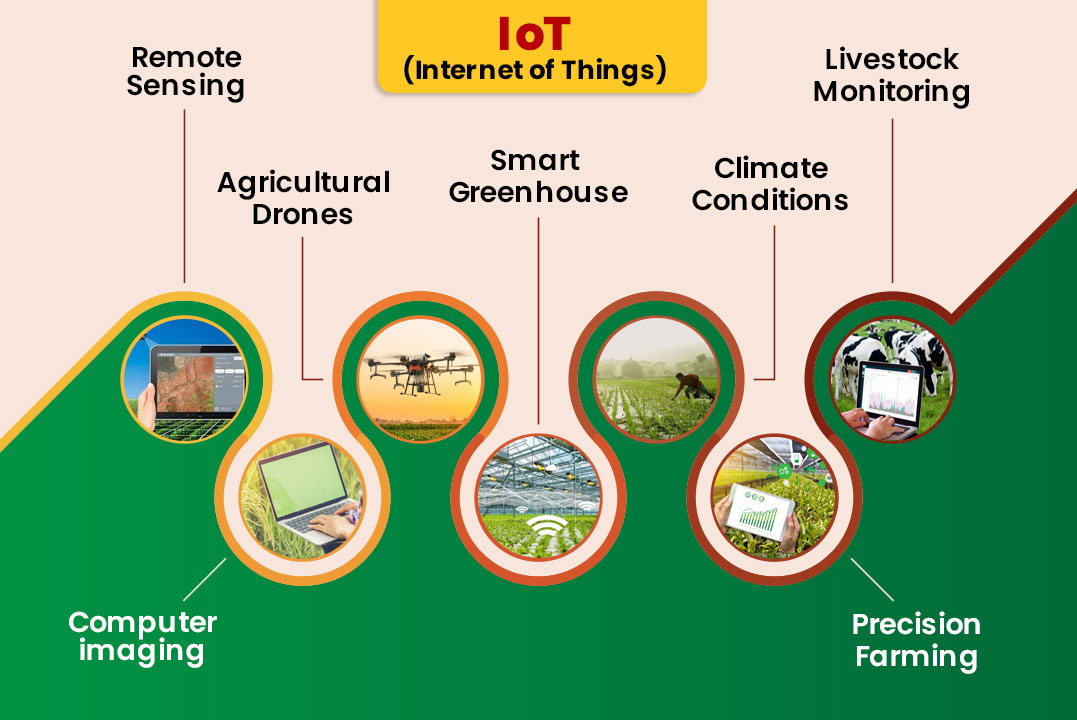
Check more technologies and farming equipment, by connecting with TractorGuru.
Related Search



